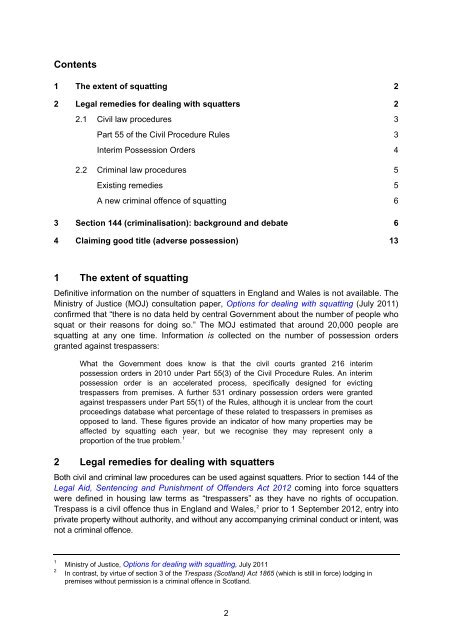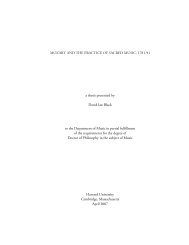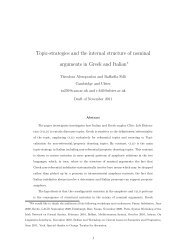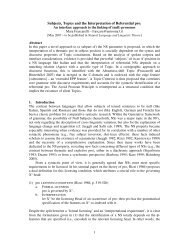Squatting in residential premises
Squatting in residential premises
Squatting in residential premises
You also want an ePaper? Increase the reach of your titles
YUMPU automatically turns print PDFs into web optimized ePapers that Google loves.
Contents<br />
1 The extent of squatt<strong>in</strong>g 2<br />
2 Legal remedies for deal<strong>in</strong>g with squatters 2<br />
2.1 Civil law procedures 3<br />
Part 55 of the Civil Procedure Rules 3<br />
Interim Possession Orders 4<br />
2.2 Crim<strong>in</strong>al law procedures 5<br />
Exist<strong>in</strong>g remedies 5<br />
A new crim<strong>in</strong>al offence of squatt<strong>in</strong>g 6<br />
3 Section 144 (crim<strong>in</strong>alisation): background and debate 6<br />
4 Claim<strong>in</strong>g good title (adverse possession) 13<br />
1 The extent of squatt<strong>in</strong>g<br />
Def<strong>in</strong>itive <strong>in</strong>formation on the number of squatters <strong>in</strong> England and Wales is not available. The<br />
M<strong>in</strong>istry of Justice (MOJ) consultation paper, Options for deal<strong>in</strong>g with squatt<strong>in</strong>g (July 2011)<br />
confirmed that “there is no data held by central Government about the number of people who<br />
squat or their reasons for do<strong>in</strong>g so.” The MOJ estimated that around 20,000 people are<br />
squatt<strong>in</strong>g at any one time. Information is collected on the number of possession orders<br />
granted aga<strong>in</strong>st trespassers:<br />
What the Government does know is that the civil courts granted 216 <strong>in</strong>terim<br />
possession orders <strong>in</strong> 2010 under Part 55(3) of the Civil Procedure Rules. An <strong>in</strong>terim<br />
possession order is an accelerated process, specifically designed for evict<strong>in</strong>g<br />
trespassers from <strong>premises</strong>. A further 531 ord<strong>in</strong>ary possession orders were granted<br />
aga<strong>in</strong>st trespassers under Part 55(1) of the Rules, although it is unclear from the court<br />
proceed<strong>in</strong>gs database what percentage of these related to trespassers <strong>in</strong> <strong>premises</strong> as<br />
opposed to land. These figures provide an <strong>in</strong>dicator of how many properties may be<br />
affected by squatt<strong>in</strong>g each year, but we recognise they may represent only a<br />
proportion of the true problem. 1<br />
2 Legal remedies for deal<strong>in</strong>g with squatters<br />
Both civil and crim<strong>in</strong>al law procedures can be used aga<strong>in</strong>st squatters. Prior to section 144 of the<br />
Legal Aid, Sentenc<strong>in</strong>g and Punishment of Offenders Act 2012 com<strong>in</strong>g <strong>in</strong>to force squatters<br />
were def<strong>in</strong>ed <strong>in</strong> hous<strong>in</strong>g law terms as “trespassers” as they have no rights of occupation.<br />
Trespass is a civil offence thus <strong>in</strong> England and Wales, 2 prior to 1 September 2012, entry <strong>in</strong>to<br />
private property without authority, and without any accompany<strong>in</strong>g crim<strong>in</strong>al conduct or <strong>in</strong>tent, was<br />
not a crim<strong>in</strong>al offence.<br />
1 M<strong>in</strong>istry of Justice, Options for deal<strong>in</strong>g with squatt<strong>in</strong>g, July 2011<br />
2 In contrast, by virtue of section 3 of the Trespass (Scotland) Act 1865 (which is still <strong>in</strong> force) lodg<strong>in</strong>g <strong>in</strong><br />
<strong>premises</strong> without permission is a crim<strong>in</strong>al offence <strong>in</strong> Scotland.<br />
2
















